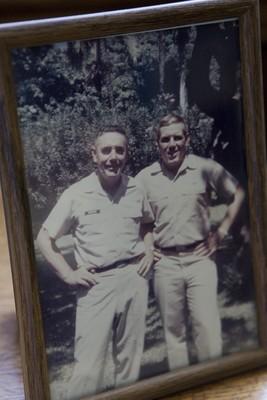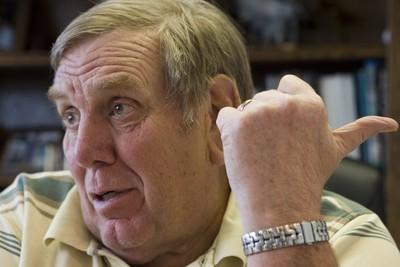OF FATHERS AND SONS


Mitch Cobeaga and his dad had a special bond, one few can match.
They both flew warplanes in combat. They both knew the horrors of war.
They both wondered why hope for winning the Vietnam War collapsed under the weight of U.S. policy and whether that sentiment will persist against the U.S. military efforts in Iraq and Afghanistan.
“I heard somebody say the other day, ‘Well, we’ve only lost 3,700 people there while we lost 50,000 in Vietnam.’ That’s well and good unless you’re one of the 3,700 mothers who had to bury their son,” Cobeaga said last week at his law office in downtown Las Vegas, surrounded by models of the jets he flew and photos of his father, Mitchell Anton Cobeaga.
Today, when the nation honors the heroes who gave their lives in combat, Mitch Cobeaga said he too will pause to think about them and all who have served, especially his father, who died in January.
Together, they were the only native-born father and son team from Nevada to fly in combat at the same time over Vietnam. It required special orders for a pilot to serve in a war zone with his sole surviving son.
“I can’t say how grateful I am that I had my father as long as I did and how proud I am of him,” he said about his father, who was 89.
“He was my best friend. We spent a lot of time together.”
Mitch Cobeaga flew 100 missions over North Vietnam in 1966 and 1967 and 24 over Laos in F-4 Phantom jets. “I had 13 classmates from the Air Force Academy who were POWs,” he said.
His father was a decorated World War II and Vietnam War bomber pilot. He was born in 1917, the son of Basque shepherds who had come to Lovelock from Spain.
A multisport athlete at the University of Nevada, Reno, he tried out as a shortstop with the San Francisco Seals, which at the time was the triple-A farm team for the New York Yankees. A dislocated shoulder injury from college football ended his baseball career.
He joined the Army Air Corps in 1938.
“The other Basque guys had gone into the service and were flying. He thought that was the way to go. He decided that’s what he wanted to be,” Mitch Cobeaga said.
A B-17 bomber pilot, the elder Cobeaga took his bride, Mary Sala of Ely, to his Hawaii duty station in Honolulu at Hickam Field near Pearl Harbor in 1941.
While she stayed at their home on the front row of houses facing the harbor, he returned to the West Coast to pick up an airplane. Engine trouble delayed his immediate return. While he was waiting for it to get repaired, Japanese warplanes made their historic attack on Dec. 7, 1941.
“She saw the Nevada beach and sink,” Mitch Cobeaga said of his mother, who died in 1996.
His mother was among the civilians who took refuge at higher ground.
“They evacuated the dependents up into the hills,” he said.
His father was frustrated by the circumstances.
“He said it was the most nerve-wracking period. At that time, everyone assumed that they were going to follow up with an invasion of Hawaii.”
After the attack, his parents were reunited when his dad returned with a B-17 for the fight in the Pacific. They were together for about two months.
Mary Cobeaga was then put on a ship to San Francisco. There, she boarded a bus bound for Ely, where their son, J. Mitchell “Mitch” Cobeaga, was born on April 22, 1942.
During World War II, his father flew out of New Guinea conducting bombing raids on Japanese shipping lanes. For his efforts, he was awarded the Distinguished Flying Cross and the Bronze Star.
It wasn’t until summer 1944 that the elder Cobeaga returned to Ely and saw his son for the first time.
Mitch Cobeaga said he doesn’t recall the moment. “But apparently I went in and told my uncle there’s somebody in bed with Mom.”
His dad was honorably discharged from the military in 1947, the year that Mitch’s sister, Catherine, was born.
“He went back to the university to try and complete his degree but was recalled in 1949 before he could finish,” Mitch Cobeaga said.
Lean years followed while young Mitch was growing up in Ely. “What I really remember is, we were dead broke and we hunted and fished for what we ate,” he said. “He was the prototype sheepherder. Strong and pretty quiet back in those days.”
During the Korean War, his father served in the Strategic Air Command flying the B-50 bomber, stationed in England on nuclear alert. The family stayed stateside at Biggs Air Force Base near El Paso, Texas.
With stints at various bases and his assignment at the Pentagon, Mitch Cobeaga led the lifestyle of a military brat, attending 11 schools in 12 years.
After graduating from high school in 1960, he decided to follow his father’s footsteps in flying. He graduated from the Air Force Academy in Colorado in 1964. After pilot training, he was ready to fly F-4s in the Vietnam War.
His tour began in Thailand in early 1967, the same time his dad was commanding the 22nd Bomb Wing at March Air Force Base, near Riverside, Calif.
“They got orders. He was taking the wing over to take over the B-52 effort in Vietnam, and that gave me the option of coming home since I was the sole son,” Mitch Cobeaga recalled.
“I told him I wasn’t going to come home until I finished my tour. Since he was commander of the outfit, he felt obligated, so we had to get a waiver and we thought that was really neat.
“My mother did not. She was the one at Pearl Harbor, and now she’s sitting in California with both of us over there flying. We had a period of about 2 1/2 months where he was flying the B-52 and I was flying the Phantom.”
His dad was flying missions from Guam over South Vietnam, and he was flying from Thailand on missions over North Vietnam and northern Laos.
“We had no communication. I think I talked to him on the phone once the entire time I was there,” he said.
“He was immensely proud of his troops. They absolutely loved him. Everyone I ever talked to in his unit said he was the best commander they ever had. He was not the rocket scientist from West Point or Purdue, but he had a lot of people skills.”
His father had opinions on how the Vietnam War was being fought.
“The thing that got to him most … is that what was done finally in 1972 could have been done in 1966 and we didn’t have to go through the whole mess.
“We had never made a decision to win the war, and when Nixon finally decided to go in … and did that bombing,” he said. “He was very discouraged by why it took so long. He was most discouraged by the fact that there was no goal of winning.”
Mitch Cobeaga pointed to a map of Hanoi on his wall with red marks on the communist MiG bases.
“I’ll tell you what else was tough, was flying over airfields in North Vietnam watching the MiGs taxi out to come shoot us down. We weren’t allowed to drop a bomb on them because President Johnson didn’t want to upset them,” he said.
His dad retired from the Air Force as a colonel and moved to Las Vegas, where he had a second career with the Nevada State Bank, retiring in 1982.
“He followed the war in Iraq closely, and he felt we were doing much the same in Iraq and Afghanistan as we were in Vietnam,” Mitch Cobeaga said.
Mitch’s son, Paul Cobeaga, went to the Air Force Academy, as did two of his stepchildren.
“So my dad’s influence over the entire family is fairly significant,” Mitch Cobeaga said. “When Paul was over in the Gulf region a year ago, he was fearful for his safety but very proud of the fact that he was the third in the line.”
He sees similarities between the war on terrorism and the Vietnam War.
“I don’t think we can ever impose our will on other people. We can support them and we can do what we can, but to try and force other people into our quote ‘way of life’ will probably never work.”












